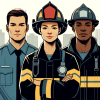A candidate posted a question on a bulletin board asking the best way to approach the common scenario of being given an order on an emergency scene that puts your life or others’ in jeopardy that may also go against standard operating procedures.
Someone posted an answer that looked like it came right out of one of the books out there with question and suggested answers. Turns out it was word for word from one of those books!
My reply: “Too many will use these suggested answers word for word like someone posted here. If I picked this right up so can other panel members.”
Panel members can often tell by the second or third question where the candidate got their answers. Sources could include a fire academy (where they practice using 3x5 cards), college classes, medic school, a book or CDs. It makes the candidate look and sound like a clone of too many others.
We experience this talking to a lot of candidate’s daily and during one-on-one coaching.
So it’s your second day of eight days of oral interviews as a panel member. You’re hearing too many candidates with the same answers — identical answers word-for-word, complete with pauses from the CDs. You wonder who really owns the information and experience. It can be mind numbing for panel members.
One medic candidate just told me after taking 11 tests and not getting hired that he felt this type of one size fits all format of using suggested answers was like reading a personal diary.
He said the CDs he purchased from a program was not the guy who wrote the material, but a monotone voice of someone reading the material. In just a few minutes of listening his mind would wonder, start looking out the window at the birds, and he’d lose interest.
Three weeks ago he changed to being more personable, more himself and feels unique, fresh and spontaneous. His first interview since he switched, he was hired.
“Let me put it to you this way. If you read a book that gives you the answers, you are not going to sound like you,” said Captain Rob Smith. “You will sound like the person that wrote the book. Not only that, but because you didn’t come up with the answer on your own, what if they ask you to explain you reasoning in doing what you did? You don’t know because it wasn’t your answer,” he said.
Another problem could be that if you are quoting answers from a book you read or a person who taught a class, others may be quoting it also. What if you are in the oral interview for your dream department, the one you have waited for your whole life, and after your second response they stop you.
They tell you that it is funny, but the three people before you have answered every question word-for-word the same as you, and they want to know if they are going to get to hear your answers or should they just give you the score they gave the others?
I would sure want to be giving my own original answers and not something someone else gave me as their answer. If you can find a way to come up with your own answers, it will also help you if they ask questions that you have never heard before. Because you will have figured out how to come up with your own answers, not just look them up.
To learn more about the hiring process and Oral Board Interviews, with 300 pages of free information visit www.eatstress.com


